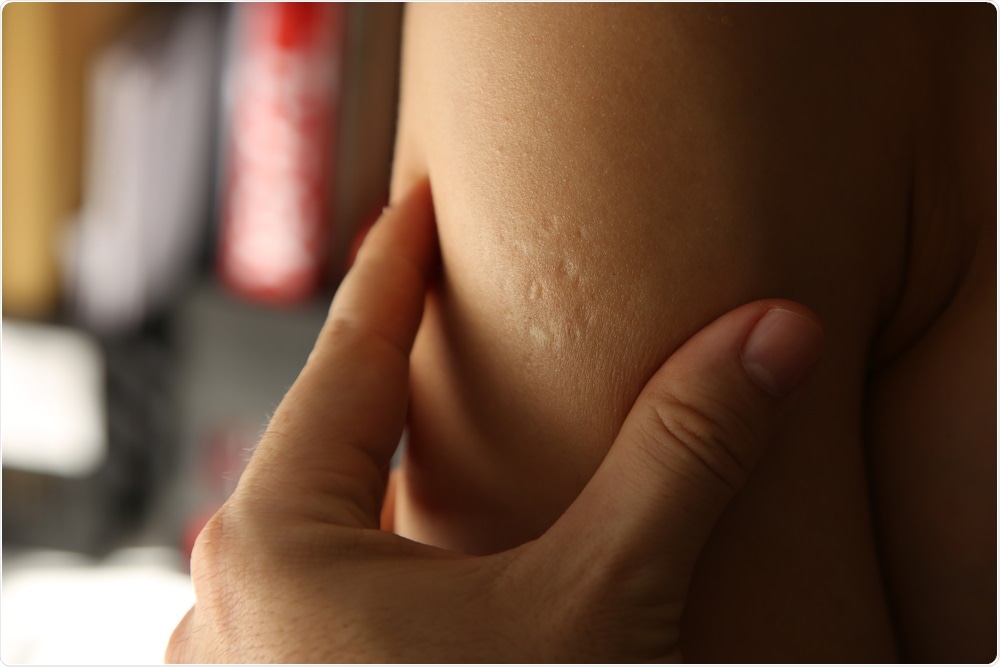The analysis found that among people born when Spain had a program for universal BCG vaccination, rates of confirmed cases of COVID-19 and deaths were slightly lower compared with among people in Italy where no such universal BCG program was ever introduced.
Levine hopes the findings will encourage analysts to access more detailed data covering more outcomes by age and larger sample size to help provide more reliable data.
A pre-print version of the paper can be accessed on the server medRxiv*, while the article undergoes peer review.

Bacille Calmette Guerin vaccine (BCG) skin scars. Image Credit: MD_Photography / Shutterstock

 *Important notice: medRxiv publishes preliminary scientific reports that are not peer-reviewed and, therefore, should not be regarded as conclusive, guide clinical practice/health-related behavior, or treated as established information.
*Important notice: medRxiv publishes preliminary scientific reports that are not peer-reviewed and, therefore, should not be regarded as conclusive, guide clinical practice/health-related behavior, or treated as established information.
BCG and COVID-19
According to Levine, evidence suggests that BCG (Bacillus Calmette–Guérin) vaccination against tuberculosis strengthens the innate immune system response against other diseases, possibly including COVID-19.

Bacteria Mycobacterium tuberculosis, the causative agent of tuberculosis. Illustration Credit: Kateryna Kon / Shutterstock
Nations such as Italy and the United States, where BCG vaccination was never made universal, have higher reported rates of COVID-19, compared with nations where vaccination was made universal.
This led to randomized trials looking at whether vaccination protected against COVID-19 among health workers, but results were unreliable because countries with ongoing BCG vaccination tend to be under-resourced and would have lower COVID-19 testing rates.
Now, Levine has expanded on these studies by examining data from Spain, where universal BCG vaccination was carried out between 1965 and 1981. Confirmed cases of COVID-19 and mortality were assessed among cohorts born approximately a decade before and a decade after Spain ended the vaccination program in 1981. The results were compared with those from similar cohorts in Italy, where universal BCG vaccination was never introduced.
Similarities between Spain and Italy
Spain and Italy are similar in many ways, and before the COVID-19 outbreak, life expectancy was almost 83 years in both countries, which is among the highest in Europe. Both countries have good-quality healthcare systems that are mainly free of cost, and the nations have a similar age distribution, similar obesity, and diabetes rates, and a similar availability of hospital beds.
Since the COVID-19 outbreak in Wuhan, China, late last year, the pandemic quickly started spreading in Italy and Spain in mid-February, and by the end of March, both countries had the highest numbers of confirmed cases in the world.
“At the time of our data collection, both nations had similar rates of mortality attributed to COVID and of COVID testing per million population,” writes Levine.
What did the study find?
The study examined confirmed cases of COVID-19 and deaths using data available for 10-year age groupings in each country, with data from Spain covering up to 1st May 2020 and data from Italy covering up to 28th April.
In Italy, the number of confirmed cases among people in their 40s was 1.70 for each once case among people in their 30s. In Spain, the number among people in their 40s was 1.55 for each one case among people in their 30s.
Among those in the Spanish cohort that received BCG vaccination, the likelihood of a confirmed case of COVID-19 was significantly lower, with a relative risk of 0.962.
In Italy, the number of confirmed deaths from COVID-19 among those in their 40s was more than four for each one death among those in their 30s. In Spain, the number was just under three among those in their 40s for each death among those in their 30s.
Evidence suggested that the BCG cohort in Spain had lower mortality, with a relative risk of 0.929, although the small sample size meant this reduction in risk was not statistically significant.
“A shred of evidence”
“These suggestive results provide a shred of evidence that BCG vaccinations help protect against COVID,” says Levine.
However, the study uses coarse measures of exposure to BCG vaccination and broad age ranges, with no covariates aside from a basic adjustment for age distribution, he adds.
“In short, an important reason for releasing this analysis is to encourage analysts with access to more detailed data to perform a regression discontinuity study with narrower bandwidth,” says Levine.
He suggests that data on outcomes by age or year of birth would enable the analysis to be repeated using confirmed cases over a narrower bandwidth of ages such as 36-38 years and 40-42 years, for example: “As the age window narrows, the study design becomes closer to a regression discontinuity design, which is more credible.”
Levine concludes by saying it would also be useful to make comparisons with other nearby nations such as France and Portugal and to have additional data on other outcomes such as hospitalizations.

 *Important notice: medRxiv publishes preliminary scientific reports that are not peer-reviewed and, therefore, should not be regarded as conclusive, guide clinical practice/health-related behavior, or treated as established information.
*Important notice: medRxiv publishes preliminary scientific reports that are not peer-reviewed and, therefore, should not be regarded as conclusive, guide clinical practice/health-related behavior, or treated as established information.